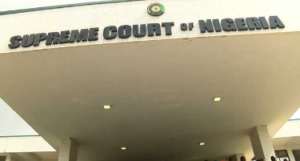The Federal High Court in Lagos has mandated the final forfeiture of $16,500 and an additional ₦127 million that were illicitly siphoned from the Nigerian Maritime Administration and Safety Agency (NIMASA). These funds are now to be permanently forfeited to the Federal Government of Nigeria.
The decision was made by Justice Kehinde Ogundare following an application from the Economic and Financial Crimes Commission (EFCC). The application was filed and presented by EFCC counsel, Sulaiman Sulaiman, who informed the court that the monies were the proceeds of illegal activities.
On May 23, 2024, the court had initially ordered the interim forfeiture of the funds based on an ex parte application brought before it under Section 17 of the Advance Fee Fraud and Other Fraud Related Offences Act No. 14. 2006; and Section 44 (2)(B) of the Constitution of the Federal Republic of Nigeria 1999 (As Amended).
Following the interim order, the court directed the EFCC to publish the order in a national newspaper, giving any interested parties the opportunity to contest the final forfeiture. At the subsequent hearing on the matter, EFCC lawyer Sulaiman Sulaiman confirmed to the court that the interim order had been published in the Punch newspaper on June 6, 2024.
“Our application for the final forfeiture of the sums is supported by a 22-paragraph affidavit deposed to by Oghare Ogbole, an investigator with the EFCC,” Sulaiman stated. He further presented two exhibits: the interim order of the court and the Punch publication of June 26, 2024. “We most respectfully adopt same and urge the court to grant the relief sought.”
After reviewing the EFCC’s submissions, Justice Ogundare granted the order as requested, finalizing the forfeiture of the funds.
The EFCC’s affidavit in support of the application provided a detailed account of the fraudulent activities involved. According to the affidavit, on October 2, 2013, NIMASA, under the leadership of Dr. Ziakede Patrick Akpobolokemi, requested the release of ₦1,123,400 billion for the implementation of International Ship and Port Security (ISPS) projects. This request was approved by then-President Dr. Goodluck Ebele Jonathan through the National Security Adviser on November 4, 2013.
 Following the release of the funds, an account was opened at Access Bank in January 2014, with Captain Bala Ezekiel Agaba, Mr. Victor I. Onuzurike, and Mr. Dele T. Ejekukor as signatories. The affidavit detailed how significant portions of these funds were diverted to various accounts controlled by Uche Obilor, a close associate of Captain Agaba. For instance, ₦437,726,666.66 was transferred to Seabulk Offshore Operator Limited, while ₦402,480,000 went to Southern Offshore Limited, and ₦66.8 million was directed to Ace Prothesis Limited.
Following the release of the funds, an account was opened at Access Bank in January 2014, with Captain Bala Ezekiel Agaba, Mr. Victor I. Onuzurike, and Mr. Dele T. Ejekukor as signatories. The affidavit detailed how significant portions of these funds were diverted to various accounts controlled by Uche Obilor, a close associate of Captain Agaba. For instance, ₦437,726,666.66 was transferred to Seabulk Offshore Operator Limited, while ₦402,480,000 went to Southern Offshore Limited, and ₦66.8 million was directed to Ace Prothesis Limited.
The affidavit revealed that large sums of money transferred to these companies were later converted to US dollars and handed over to Captain Agaba, with no services or goods provided to NIMASA in return. The EFCC investigator noted that these fraudulent transactions were uncovered during the course of their investigation, leading to the recovery of $16,500 in cash and the agreement by Uche Obilor to return ₦118 million to the EFCC.
Furthermore, the affidavit stated that Captain Agaba, who had been convicted and sentenced by the Federal High Court (per Buba, J, now retired), was later granted a pardon by the Council of State. The EFCC maintained that the funds sought for forfeiture were reasonably suspected to be proceeds of unlawful activities and had been used for personal gain rather than the intended ISPS projects.
The court’s decision to finalize the forfeiture order underscores its commitment to ensuring that the proceeds of corruption are returned to the state. This case highlights the significant role of the EFCC in combating financial crimes and ensuring that public funds are protected from misuse.
In conclusion, Justice Ogundare’s ruling reinforces the legal framework aimed at tackling corruption and financial misconduct in Nigeria. It sends a clear message that the judiciary will uphold due process and ensure that justice is served, particularly in cases involving the misappropriation of public funds.




